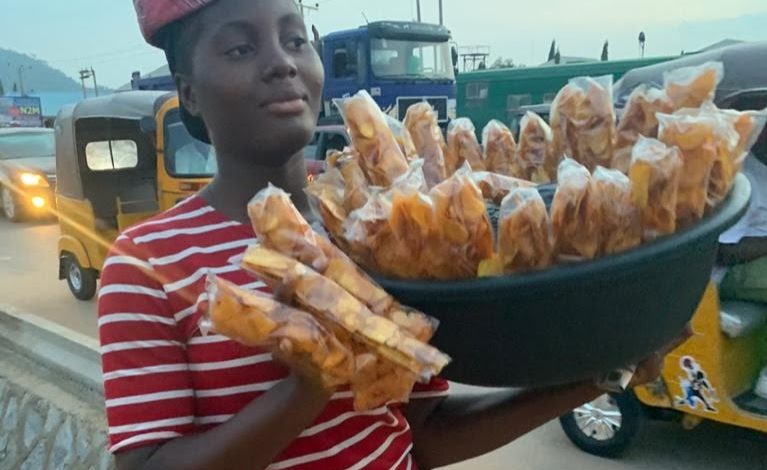
It was a cool evening in Dutse, a suburb of Abuja, Nigeria’s capital, as 20-year-old Mary ran after vehicles with a black bowl full of fried plantain chips, packaged in transparent nylon well balanced on her head and some three samples in her right hand. This is her daily routine.
On the Dutse-Bwari road, Mary is a regular face in the midst of male dominated street hawkers and she is the only female in the park.
She, like other young girls and children hawking on busy roads across the country’s seat of power, faces the risk of getting run over by motorists and being abused both physically and psychologically. While Mary, who hails from Delta State, South-south Nigeria admits that there are dangers in running on the busy road every evening, she says hawking in the traffic is more or less a family business for her and her siblings.
Getting involved
Before she completed her secondary school education, then a teenager, Mary whose parents live in Zuba, another suburb of Abuja, nearly a 20-minute drive from Dutse, started hawking potato and plantain chips in the traffic to support the family.
Despite having learned tailoring, a more lucrative enterprise, the young Mary continues to help her mother who fries the chip to hawk.
“When I was in school and even while I was learning tailoring, I came here after I was done. Then I leave the house by 5 p.m. so that I can get here before 6 p.m., that is when the traffic starts to build up.”
But the usual traffic gridlock on the ever busy road is to her advantage because hawkers make more sales when commutters and motorists ‘see’ them. “Sometimes if there is a serious holdup, I can make up to N4000 in a day,” Mary told HumAngle.
“I am doing this to help my mom,” she quips.
Sustaining a family business
Though street hawking is outlawed in Abuja by the authorities, it is nevertheless a family business for Mary, her mother and siblings. “This is my mother’s business and she hawks too.”
For her mother, she also journeys daily from Zuba, leaving her home by 1 p.m WAT to the heart of the town in Area 1 where she sells her snacks. She has been in the business for over 15 years.
When her mother returns home at 10 or 11 p.m., she starts getting ready for the next day, Mary reveals.
“My mum makes the chips in large quantities. She normally makes what we can sell so it won’t get spoiled, we make it fresh everyday,” she explains.
The aspiring fashion designer has also had her elder siblings hawk on the same road before the role fell on her, and she hopes to leave soon to start up her own business.
“My elder siblings were hawking here before but are no longer hawking, so it’s just me and my mum because my younger brother is still small and he can’t sell yet.”
“My eldest sister is married, so she stopped and my brother is staying with her over there. My father is old, he doesn’t have that much strength to work,” Mary continues.
“The profit is just enough to run the family”
What my mother makes is just enough to provide for the basic things we need to survive. Any support we get from family members is just from only my elder brother and sister, no other person,” she says with a bit of hesitation.
Mary and her mother make an Average of N8000 collectively in a day, which has to be reinvested into the business, “honestly it’s a bit difficult because she complains that the prices of things are increasing,” she added.
“In a day, I bring a basin of potato chips on average of N8000, although it depends on the arrangement, it’s how you arrange it that will determine the amount of chips the basin will contain.”
If the chips are well arranged, Mary says it will contain large quantities and if it’s loose, it won’t contain much.
Mary closes by 8 p.m., after the congestion has subsided. “Everybody packs their goods and leaves because there is nothing for us again by that time.”
Across towns and cities in Nigeria, it is common to find hawkers who have taken to the streets to solve problems such as unemployment, poverty, hunger and consumer goods accessibility.
In 2016, the Lagos State Government placed a ban on street hawking with a fine or a six-month-jail-term for street hawkers and those who buy from them.
It has over the years become a booming informal sector that has proved resilient despite various governmental efforts aimed at putting an end to it.
Support Our Journalism
There are millions of ordinary people affected by conflict in Africa whose stories are missing in the mainstream media. HumAngle is determined to tell those challenging and under-reported stories, hoping that the people impacted by these conflicts will find the safety and security they deserve.
To ensure that we continue to provide public service coverage, we have a small favour to ask you. We want you to be part of our journalistic endeavour by contributing a token to us.
Your donation will further promote a robust, free, and independent media.
Donate HereStay Closer To The Stories That Matter





